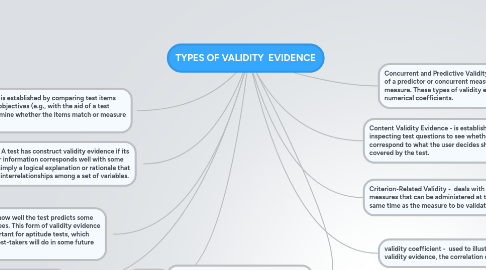TYPES OF VALIDITY EVIDENCE
by Fly Quarles

1. a test refers to the consistency with which it yields the same rank for individuals who take the test more than once
2. validity coefficient - used to illustrate validity evidence, the correlation coefficient
3. Predictive Validity - refers to how well the test predicts some future behavior of the examinees. This form of validity evidence is particularly useful and important for aptitude tests, which attempt to predict how well test-takers will do in some future setting.
4. Construct Validity - A test has construct validity evidence if its relationship to other information corresponds well with some theory. A theory is simply a logical explanation or rationale that can account for the interrelationships among a set of variables.
5. Content Validity - is established by comparing test items with instructional objectives (e.g., with the aid of a test blueprint) to determine whether the items match or measure the objectives.
6. Reliablilty
7. validity coefficient - used to illustrate validity evidence, the correlation coefficient
8. Content Validity Evidence - is established by inspecting test questions to see whether they correspond to what the user decides should be covered by the test.
9. Criterion-Related Validity - deals with measures that can be administered at the same time as the measure to be validated.
9.1. Predictive Validity - refers to how well the test predicts some future behavior of the examinees. This form of validity evidence is particularly useful and important for aptitude tests, which attempt to predict how well test-takers will do in some future setting.
10. Concurrent and Predictive Validity - requires the correlation of a predictor or concurrent measure with a criterion measure. These types of validity evidence do yield numerical coefficients.


